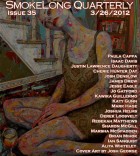Tell us about the title. We don’t find out that this is the narrator’s name until the end. Why?
Lacrimosa in this story is not in fact the narrator’s name (although it is quite pretty), but a section of the requiem mass by Mozart, based on a medieval hymn for the dead. Lacrimosa means “mournful,” and the section goes something like this:
“That day of sorrow will be the judgement day
When from the ashes shall rise
All humanity to be judged.
Grant them eternal rest, O Lord,
Amen.”
In the story, Johnboy uses the word to sum up his feelings on dying, and concludes with the rather opportunistic assertion that if God won’t give him mercy, he’ll find another who will. I’m an atheist, but religion and spirituality fascinate me, and there ain’t no denying religion has been the source of some of the most emotive and beautiful music.
What is the true relationship between her and the uncle? Why is it up to her to tell his story?
He’s essentially a weird old homeless guy who is one of those harmless local faces in a small town — an oddball who attracts and befriends curious kids, but who is benign enough not to worry the parents. The narrator is closer to him than most, and whereas the other kids grow up and develop an uncomfortable wariness around him, she retains a sympathetic desire to somehow save him from not fitting into the world. Perhaps he really was a sailor once, or maybe he just managed to buy a cheap boat to live on and invented the stories of his adventures.
Is Uncle Johnboy based on someone you know? Is the narrator?
I suppose he’s “that eccentric guy” you see on the streets almost anywhere you go. Someone who doesn’t conform but doesn’t profit from it. At least in Johnboy’s case he never loses his optimism. When I was a teenager I used to go busking in the middle of town, and got to know a homeless man who sold The Big Issue (a British magazine to help the homeless earn an income and take steps to “reclaim their citizenship”). He entertained passing kids with Sesame Street puppets and used to request I play A Hard Day’s Night repeatedly. One day he suggested I come back to meet him for a drink in the evening. I did, but he wasn’t coherent when I found him, he didn’t recognise me and asked me for spare change. After a while he remembered who I was and we sat on the beach while he told me how he ended up homeless. He was just a normal bloke, nothing exceptional about his life apart from doing too many drugs. There’s such a huge “us and them” divide, most of us find it hard to even make eye contact with homeless people. It’s just so sad.
How did you start writing this story? What was the first thing on paper? What was the last?
I’m a member of a writing community called Show Me Your Lits, which hosts a weekly 90 minute flash challenge. Shame on me, but I can’t actually remember the prompts, though I think there was something to do with The Owl and the Pussy Cat and definitely something religious. The St Bartholomew’s in the story is a real church that’s local to me, a great looming monolith based on the upturned Ark. A little light Googling on the apostle Bartholomew brought up some other interesting elements, like the many various ways he was apparently killed, and these got worked into the story too. If I remember correctly it was pretty much written in the sequence it is now — I only had an hour and a half to research, write, edit and submit the story — and it turned out to be one of those tales that seems to flow fairly seamlessly. So the first line remains pretty much unchanged, and the last things I wrote were a few lines of editing away from the “Big Honkin’ Timer” to tie up some loose ends about Johnboy’s relationship with the girl.
Whose writing (flash fiction or otherwise) inspires you to write? Do you participate in any other artistic endeavors (photography, painting, etc.)?
Aside from the amazingly supportive and talented community at Show Me Your Lits, I’m a die-hard fan of Amy Hempel’s short fiction — she’s the master of the perfect sentence and not one word is ever wasted. Other inspiration comes from Kurt Vonnegut, Joseph Heller and Gabriel Garcia Marquez — writers who consistently leave me reeling and whose work I could read over and over. As for other artistic endeavours, I used to be an amateur filmmaker, and I play guitar and sing. More recently I have become something of a 50s housewife, knitting, baking and sewing clothes for my kids. I tend to get itchy, idle hands when I’m not doing several things at once, so flash fiction and knitting are excellent pick-up-put-down pastimes that can be easily worked around the chaos of small children.



 The core workshop of SmokeLong Fitness is all in writing, so you can take part from anywhere at anytime. We are excited about creating a supportive, consistent and structured environment for flash writers to work on their craft in a community. We are thrilled and proud to say that our workshop participants have won, placed, or been listed in every major flash competition. Community works.
The core workshop of SmokeLong Fitness is all in writing, so you can take part from anywhere at anytime. We are excited about creating a supportive, consistent and structured environment for flash writers to work on their craft in a community. We are thrilled and proud to say that our workshop participants have won, placed, or been listed in every major flash competition. Community works.